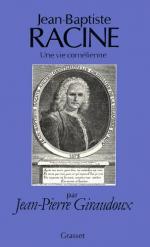|
This section contains 5,314 words (approx. 18 pages at 300 words per page) |

|
SOURCE: McClure, Ellen. “Sovereign Love and Atomism in Racine's Bérénice.” Philosophy and Literature 27 (2003): 304-17.
In the following essay, McClure asserts that Bérénice reflects the influence of Epicureanism, Cartesianism, and contemporary controversies concerning the material nature of the universe, particularly in the portrayal of the character Antiochus.
Although critics have noted links between the new science of the seventeenth century and the works of La Fontaine and Molière,1 a similar influence of Epicureanism or even Cartesianism upon French classical tragedy is harder to trace. No two areas of seventeenth-century cultural life would seem farther apart than the emerging science, with its rejection of Aristotelian categories as inadequate to experienced reality, and classical French tragedy, with its antimaterialism and claims to universal truth often bolstered by references to none other than Aristotle himself. Yet René Pintard reminds us that the 1660s and 1670s—the period...
|
This section contains 5,314 words (approx. 18 pages at 300 words per page) |

|


